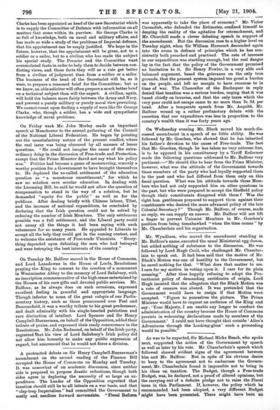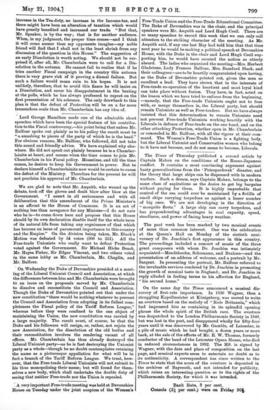As was to be expected, Sir Michael Hicks Beach, who
spoke next, supported the action of the Government by speech as well as later by his vote. Mr. Chamberlain's speech which followed showed evident signs of the agreement between him and Mr. Balfour. But in spite of his obvious desire to keep to the agreement not to embarrass the Govern- ment, Mr. Chamberlain found it impossible not to bring in his ideas on taxation. The Budget, though a Free-trade Budget, was, he declared, not a proof of altered opinions, but the carrying out of a definite pledge not to raise the Fiscal issue in this Parliament. If, however, the policy which be recommended had been adopted, a very different Budget might have been presented. There might have been no
increase in the Tea-duty, no increase in the Income-tax, and there might have been an alteration of taxation which would have greatly benefited and increased our trade. "But that, Mr. Speaker, is by the way ; that is for another audience. When, in my judgment, the proper time comes—and I think it will come sooner than my opponents imagine—my noble friend will find that I shall not in the least shrink from any discussion of the question in this House." The suggestion of an early Dissolution is worth noting. We should not be sur- prised if, after all, Mr. Chamberlain were to call for a Dis- solution in the autumn. He cannot fail to realise that if he tries another Fiscal campaign in the country this autumn there is very grave risk of it proving a dismal failure. But such a failure would mean ruin to his hopes. It is not unlikely, therefore, that to avoid this fiasco he will insist on a Dissolution, and cover his disappointment in the beating at the polls, which he has always professed to expect on the first presentation of his schemes. The only drawback to this plan is that the defeat of Protection will be on a far more tremendous scale than Mr. Chamberlain has any idea of.



































 Previous page
Previous page